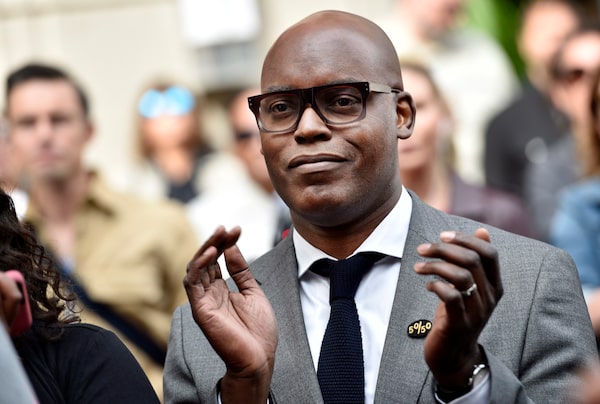
Cameron Bailey applauds remarks from the stage at the Share Her Journey Rally for Women in Film, during the Toronto International Film Festival, on Sept. 8, 2018.Chris Pizzello/The Associated Press
Thirty-one years after joining the Toronto International Film Festival as a seasonal programmer, Cameron Bailey is taking charge of the organization. On Tuesday, TIFF’s board of directors announced that Bailey was the organization’s new chief executive officer.
Bailey, who has been TIFF’s artistic director since 2012, served for the past three years as co-head of the not-for-profit institution alongside executive director Joana Vicente, who stepped down last month to become CEO of the Sundance Institute in New York.
Today’s appointment puts an end to TIFF’s two-headed leadership structure, which was adopted after long-time CEO Piers Handling departed in 2018, while also placing Bailey directly on the fault lines of a tectonic shift in the film industry landscape.
Although movie theatres are largely operating at full capacity across North America – with the five-screen TIFF Bell Lightbox finally opening for daily screenings in October, following an 18-month closure – the pandemic has severely altered audience behaviour. This past weekend’s U.S. Thanksgiving holiday box-office haul was about US$100-million short of typical pre-pandemic receipts – and the situation is even more perilous for the art-house titles that TIFF specializes in.
”We’ve all seen changes in the industry and culture over the past year, but alongside that we’ve seen the need that we all have to connect with each other, and film does that amazingly well,” Bailey said in an interview with The Globe and Mail the day before his appointment was made public. “People want to come to see a film and talk about it online, and we’re also watching much more on streaming than we used to. We have to be part of that landscape, while also making sure the Lightbox is a destination for people year-round. We have the best cinemas in the country and the best cinema team in the country.”
Long focused on TIFF’s programming and presentation, Bailey said that a “lot of things that I’ve been doing, I won’t be doing in the same way or to the same extent,” in his new role, and that he is “looking for additions” to his team. “I’ve had to roll up my sleeves and figure out the nuts and bolts of TIFF, and now my job is to take ultimate responsibility for ensuring that they all work.”
Bailey takes the reins of TIFF as the organization nears the end of its five-year 2018-2022 strategic plan “Audience First,” whose ambitions – “more people, more often, more impact” – were derailed by the pandemic. The new plan, which Bailey is currently developing, focuses on three pillars: the future of the festival, the expansion of TIFF’s year-round operations and building a strong and sustainable organization.
Part of that plan is ensuring that the Lightbox itself – a massive piece of real estate in the heart of Toronto’s entertainment district – becomes less of a mystery outside of the two weeks every September in which the festival takes over a chunk of the city’s psyche.
”Part of it is seeing the Lightbox’s atrium as a kind of public square, and what we can do there to engage our audience,” said Bailey. “It should be a space that when you walk in, you know that it’s a place of film culture.”
Another area of focus is the digital TIFF Bell Lightbox, a video-on-demand service that was launched “in a hurry” in summer 2020, and currently features selections from this past September’s festival, including Titane, Spencer and The Humans. “We know we’re not able to compete with giant multinationals. But we are trying to offer something carefully curated that people can depend on,” said Bailey.
Bailey’s appointment arrives the day after a large shakeup on TIFF’s board of directors. After a six-year stint, chair Jennifer Tory is stepping down, while Jeffrey Remedios, CEO of Universal Music Canada and a member of the TIFF board for the past five years, replaces her.
Meanwhile, board members Ellis Jacob (CEO of Cineplex Entertainment), Wade Oosterman (president of Bell Media), Shabin Mohamed (director of the National Gallery of Canada), Francis Shen (president of Shen Capital Corporation), Frank Kollmar (CEO of L’Oreal Canada) and Geoff Beattie (CEO of Generation Capital) are departing, with Mary DePaoli (chief marketing officer at RBC), Allen Lau (CEO of Wattpad), Devorah Lithwick (chief brand officer for Bell), Laurie May (co-president of Elevation Pictures) and filmmaker Danis Goulet joining.
”I could not be more assured in my first act as chair representing the TIFF board in the appointment of Cameron Bailey as CEO,” Remedios said in a statement. “There is no one better suited to drive TIFF forward.”
As for what 2022 might look like, Bailey is optimistic that TIFF’s 47th edition will more closely resemble prepandemic days, while also embracing digital access.
“We’re planning for more in-person [events] than the last two years, to bring people back together, but we’re not going to leave behind people who will be experiencing the festival online, either,” he said. “But we’ll do it in a way that fits the scale of what filmmakers and the film industry is looking for as well. The theatrical experience is critical to the survival of film, and we’ll lead with that.”
Plan your screen time with the weekly What to Watch newsletter. Sign up today.
 Barry Hertz
Barry Hertz